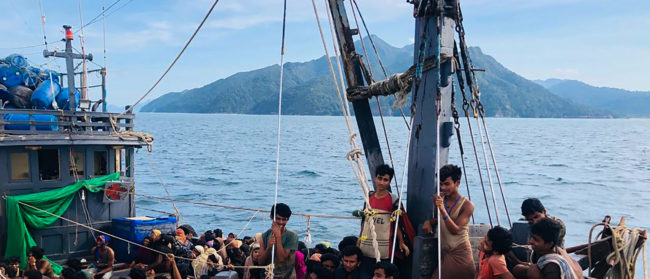A Rohingya man has become the first person to test positive for Covid-19 in the vast refugee camps in Bangladesh that are home to almost one million people, officials said on Thursday.
Health experts have long warned that the virus could race through the cramped, sewage-soaked alleys of the camps in the Cox’s Bazar district, where the persecuted Muslim minority have been housed in canvas and bamboo shacks since they fled a military offensive in neigbouring Myanmar more than two years ago.
Local health coordinator Abu Toha Bhuiyan initially said two refugees had been put into isolation.
The World Health Organisation later said one case was of a Rohingya man, and the other was of a local man who lived near the camp and was being treated at a clinic inside the area.
“One patient is from the refugee population and the other one from the surrounding host population,” WHO spokesman Catalin Bercaru told AFP.
Bercaru said “rapid investigation teams” were being deployed to follow up on the two cases. The patients’ contacts are being traced for quarantine and testing.
Local authorities said prevention measures and testing were being stepped up.
Virus to spread ‘very rapidly’
In early April authorities imposed a complete lockdown on the surrounding Cox’s Bazar district – home to 3.4 million people including the refugees – after a number of COVID-19 cases.
Bangladesh restricted all traffic in and out of the camps and forced aid organisations to slash their presence by 80%.
The refugee camp is incredibly crowded. The COVID virus will spread through there very rapidly
Sam Brownback, the ambassador-at-large for international religious freedom
But a senior US official who has visited the refugees said it was only a matter of time for the virus to reach.
“The refugee camp is incredibly crowded. The COVID virus will spread through there very rapidly, unfortunately,” said Sam Brownback, the ambassador-at-large for international religious freedom.
He voiced appreciation for Bangladesh’s welcome to the refugees, noting the government’s limited resources, but voiced alarm at the lack of health care and a ban on the internet inside the camps.
“I have been calling on the Bangladeshi government to give internet access. It just seems to me ludicrous that they’re not,” Brownback told reporters in Washington.
He also renewed concern about actions back in Myanmar, where he said the military had a “widespread, systematic” policy of denying health care to the Rohingya, whom the Buddhist-majority nation does not consider citizens.
Rights groups and humanitarian workers say the internet ban on the refugee camp, imposed in September, has worsened misinformation.
Refugees International’s senior advocate for human rights, Daniel Sullivan, said the first Covid-19 case was the “realisation of a nightmare scenario”.
“Rumours abound in the camps that COVID-19 is always fatal or that the faithful will be safe. Open communication is critical to promoting hygiene awareness and tracking the spread of the disease,” he said.
‘Thousands’ may die
Another charity that works with refugees, Save the Children, said the pandemic had shown the vulnerability of the Rohingya population.
“Now that the virus has entered the world’s largest refugee settlement in Cox’s Bazar we are looking at the very real prospect that thousands of people may die from COVID-19,” the aid agency’s Bangladesh health director Shamim Jahan said in a statement.
In the Rohingya refugee camps “there are no intensive care beds at this moment,” Jahan said.
The first novel coronavirus case was confirmed in Bangladesh in early March, and the outbreak has since worsened with at least 283 people dead and nearly 19,000 infected – figures some experts say understate the true scale of the health crisis.
The government has enforced a nationwide lockdown since March 26 in an effort to check the spread of the disease.
Despite the shutdown, the number of cases has risen sharply in recent days and the daily death toll and new infections hit a record on Wednesday.
More than 740,000 Rohingya fled a brutal 2017 military crackdown in Myanmar and resettled in the squalid refugee camps of Cox’s Bazar, where around 200,000 refugees were already living.
Updates with comments from the Rohingya refugees in the camps to be added.
© Agence France-Presse


